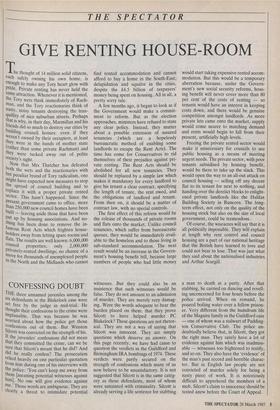THE SPECTATOR
GIVE RENTING HOUSE-ROOM
Now that Mrs Thatcher has defeated both the wets and the reactionaries with her peculiar brand of Tory radicalism, one might have expected new measures to stop the spread of council building and to replace it with a proper private rented sector. This hasn't happened. Since the present government came to office, more than 250,000 new council homes have been built — leaving aside those that have been Put up by housing associations. And no- thing has been done to remove the in- famous Rent Acts which frighten house- holders away from letting spare rooms and flats. The results are well known: 6,000,000 council properties; only 2,000,000 Pnvately-rented dwellings; no chance of a move for thousands of unemployed people in the North and the Midlands who cannot find rented accommodation and cannot afford to buy a home in the South-East; delapidation and squalor in the cities, despite the £4.5 billion of taxpayers' money being spent on housing. All in all, a pretty sorry tale. A few months ago, it began to look as if the Government would make a commit- ment to reform. But as the election approaches, ministers have refused to state any clear policy. Instead, they mutter about a possible extension of assured tenancies (which are a hopelessly bureaucratic method of enabling some landlords to escape the Rent Acts). The time has come for Conservatives to rid themselves of their prejudice against • pri- vate renting. The Rent Acts should be abolished for all new tenancies. They should be replaced by a simple law which makes it mandatory for every landlord to give his tenant a clear contract, specifying the length of tenure, the rent owed, and the obligations of landlord and tenant. From then on, it should be a matter of contract law, with no special controls. The first effect of this reform would be the release of thousands of private rooms and flats onto the market. Unlike council tenancies, which suffer from bureaucratic queues, they would be immediately avail- able to the homeless and to those living in sub-standard accommodation. The next result would be an increase in the Govern- ment's housing benefit bill, because large numbers of people who had little money would start taking expensive rented accom- modation. But this would be a temporary aberration because, under the Govern- ment's new social security reforms, hous- ing benefit will never cover more than 80 per cent of the costs of renting — so tenants would have an interest in keeping costs down, and there would be genuine competition amongst landlords. As more private lets came onto the market, supply would come nearer to matching demand and rents would begin to fall from their present, artificially high levels.
Freeing the private rented sector would make it unnecessary for councils to use public housing as a means of meeting urgent needs. The private sector, with poor tenants subsidised by housing benefit, would be there to take up the slack. This would open the way to an all-out attack on council housing — selling off any decent flat to its tenant for next to nothing, and handing over the derelict blocks to enlight- ened private landlords like the Halifax Building Society in Runcorn. The long- term effect, not only on the quality of the housing stock but also on the size of local government, could be tremendous.
Of course, the wiseacres will say that it is all politically impossible. They will explain at length why rent control and council housing are a part of our national heritage that the British have learned to love and could not bear to lose. That was just what they said about the nationalised industries and Arthur Scargill.


















































 Previous page
Previous page